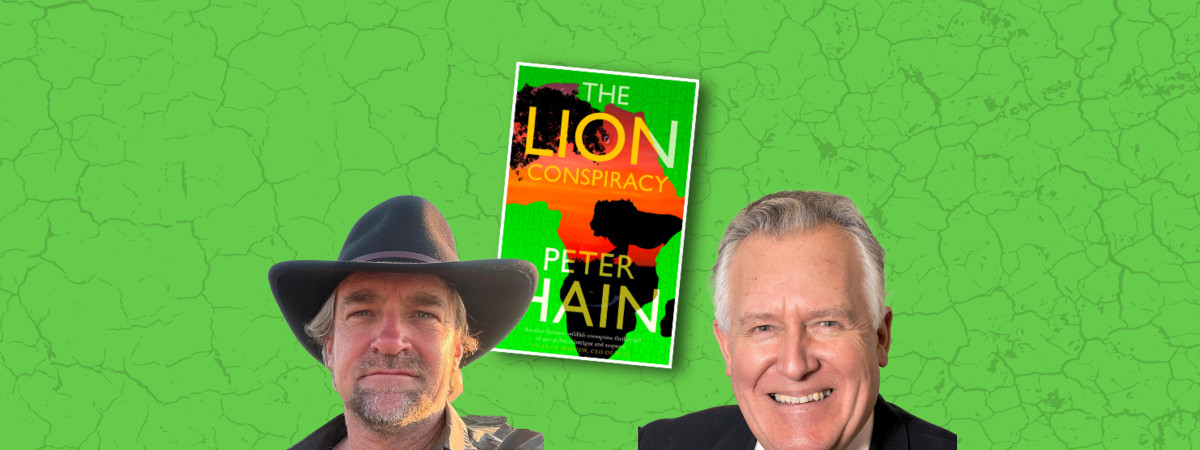‘It’s us, it’s humankind that is the real villain in all of this, isn’t it? It’s not the elephant or the rhino, or even the lion. It’s not any wildlife,” said Lord Peter Hain during a Daily Maverick webinar on Wednesday, 31 July.
“They’re just the innocent casualties of our greed.”
https://www.youtube.com/live/FwSZNEWPLuA?si=r1rMtOWRS9W6LJJw
In the webinar, Hain was discussing his new novel, The Lion Conspiracy, with investigative environmental journalist Dr Adam Cruise. The book offers a glimpse into the brutal world of wildlife poaching and state corruption.
Hain is a prominent Labour Party politician in the United Kingdom and a member of the House of Lords, but he grew up in South Africa and attended Pretoria Boys’ High School. He is also well regarded for his anti-apartheid activism.
Hain and Cruise discussed the third book in Hain’s conspiracy series, following The Rhino Conspiracy and The Elephant Conspiracy.
In this book, Hain’s previous characters return to thwart poachers driven by the soaring demand for lion parts. With action-packed scenes involving mafia smuggling and intense shootouts, this book gives an insight into the lives of activists fighting to save lions from extinction due to illegal wildlife trading.
Humans are the villains of the story
When speaking about the impact of people on conservation, Cruise noted that Hain’s book opens with a stark reminder of one of the big challenges facing lions and all wildlife – their dwindling habitats and lack of resources because of human encroachment, as well as anthropogenic climate change and biodiversity loss.
Cruise, who was hosting the webinar, highlighted that wildlife populations had declined by almost 70% since 1970 and that only 4% of mammals on earth were wild, with the rest being humans and domesticated animals.
Wildlife and politics
With Hain being a politician, he was well placed to write a book exploring the political components that influence wildlife trade and conservation.
Cruise noted that along with humans’ impact on the environment, the wildlife trade and poaching were political “and it needs a political will to solve all these issues”.
But while Hain is an expert in politics, he said it was only when he realised that lions were even more threatened than rhinos that the genesis of this book was born.
“A hundred years ago, 200,000 lions were roaming the African continent, and now there’s 20,000,” said Hain.
Cruise pointed out that while the trophy hunting of lions had been fairly well known, not enough people knew about the illicit trade in lion bones, teeth and claws, driven by international syndicates.
Read more: Kruger lions being poisoned by poachers for body parts, says SANParks
Cruise explained that in recent years, syndicates who had been dealing with rhino horn and ivory had moved into the lion trade.
“Interestingly, what’s happened – it’s part of this political kind of system – is that [this trade] was triggered probably by the South African government allowing for the legal trade in lion bones to the Far East, namely Vietnam, where their tigers have dwindled to almost nothing and they need bones for their tiger wine.
“And so they turned to South Africa and South Africa said, well, look, we’ve got this canned hunting industry where the hunters come and take their [lions] heads away, but they don’t really need the bones, so we can supply a whole lot of bones,” said Cruise.
“And this triggered a trade – suddenly the supply couldn’t match the demand. And we started to see wild lions getting poached all over Africa.”
Read more: Government reveals roadmap to slam brakes on captive lion breeding
Although the Department of Forestry, Fisheries and the Environment (DFFE) effectively stopped the legal export of lion bones (intended for use as traditional Asian medicine) in 2019, commercial captive breeding and canned hunting of lions in South Africa is still legal – with an estimated 8,000 to 12,000 lions and other big cats, including tigers, still bred and kept in captivity in more than 350 facilities around the country.
Hain realised that international wildlife crime syndicates were on a par with drug and human trafficking.
“This is big money but they only operate because politicians are being bribed all the way up,” he said.
“They are dangerous animals in the wild, of course,” said Hain, speaking about lions. “And they’re amazing animals – the kings and queens of the jungle, and they are part of our cultural folklore.
“But they’re going to be extinct by 2030 if we don’t do something about it. They are already extinct in 30 African countries. This is serious.” DM
https://www.youtube.com/watch?v=REeWvTRUpMk





